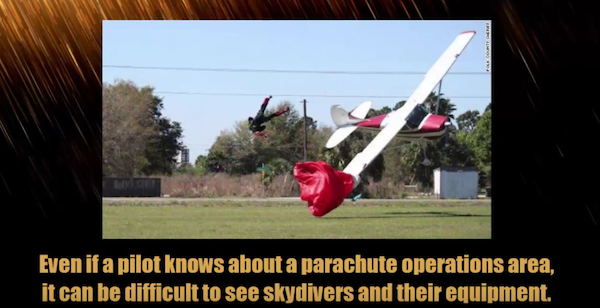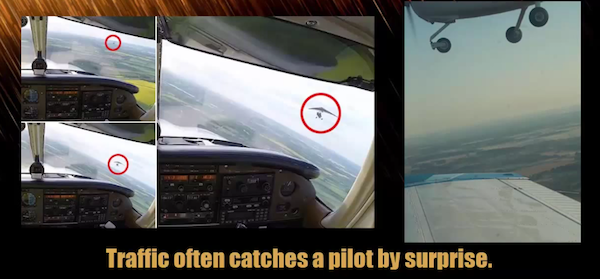
June 24, 2016 // Controllers at ZMP Improve Take on Safety Initiative
 |
| A still image from the ZMP safety video. |
Controllers at Minneapolis Center (ZMP) are raising awareness at their facility about Visual Flight Rules (VFR) parachute jumping and paragliding operations within Instrument Flight Rules (IFR) airspace. Creating a strong safety culture at ZMP is a priority for FacRep Tony Walsh and all ZMP controllers. The Air Traffic Safety Action Program (ATSAP), a non-punitive safety-reporting program that enables air traffic controllers to report safety concerns with no fear of retaliation, allows facilities like ZMP to be proactive and develop high-standards of safety training for all staff at the facility.
“In the en route environment, we stress that the primary purpose of the air traffic controller is to prevent a collision of aircraft in the system,” said Walsh. “Today, the focus is to ensure we are providing as much information to the pilots we are talking to as possible.”
Parachute-jumping activity is a prominent safety concern at ZMP that takes place in several locations throughout the facilities’ airspace. Walsh explained that in some cases, there were communication issues between aircraft and local parachute jumping companies. In other cases, there were procedural issues that needed addressing.
“The Local Safety Council (LSC) helped identify, correct, and disseminate the information to the workforce in a way that most controllers see as logical improvements to everyday operations,” said Walsh. “From these scenarios, they created a video and safety awareness discussion materials to drive the conversation surrounding IFR and VFR operations.”
ZMP controller and Master Aviator Heather McNevin was a strong collaborator on the video that is making ZMP airspace safer. This video is a proactive step for safety and a direct result of ATSAP.
In addition to the video, initial on the job training is an important step towards improving safety. ZMP is also hosting monthly Partnership For Safety (PFS) webinars that the Local Safety Council (LSC) participates in. From these webinars, ZMP gathers ideas and generates local material that fits the needs of the facility.
Recurrent training has also become a priority for ZMP controllers. It provides the opportunity for the workforce to engage in conversation that is driven from the controller perspective, according to Walsh.
“Using the recurrent training platform, we have had the chance to reinforce local content that is discussed at safety awareness discussion between recurrent training sessions,” he said.
ZMP has experienced great feedback and success on the new video and would recommend other facilities follow suit in efforts to make the NAS as safe and efficient as possible.
 |
| A still image from the ZMP safety video. |

